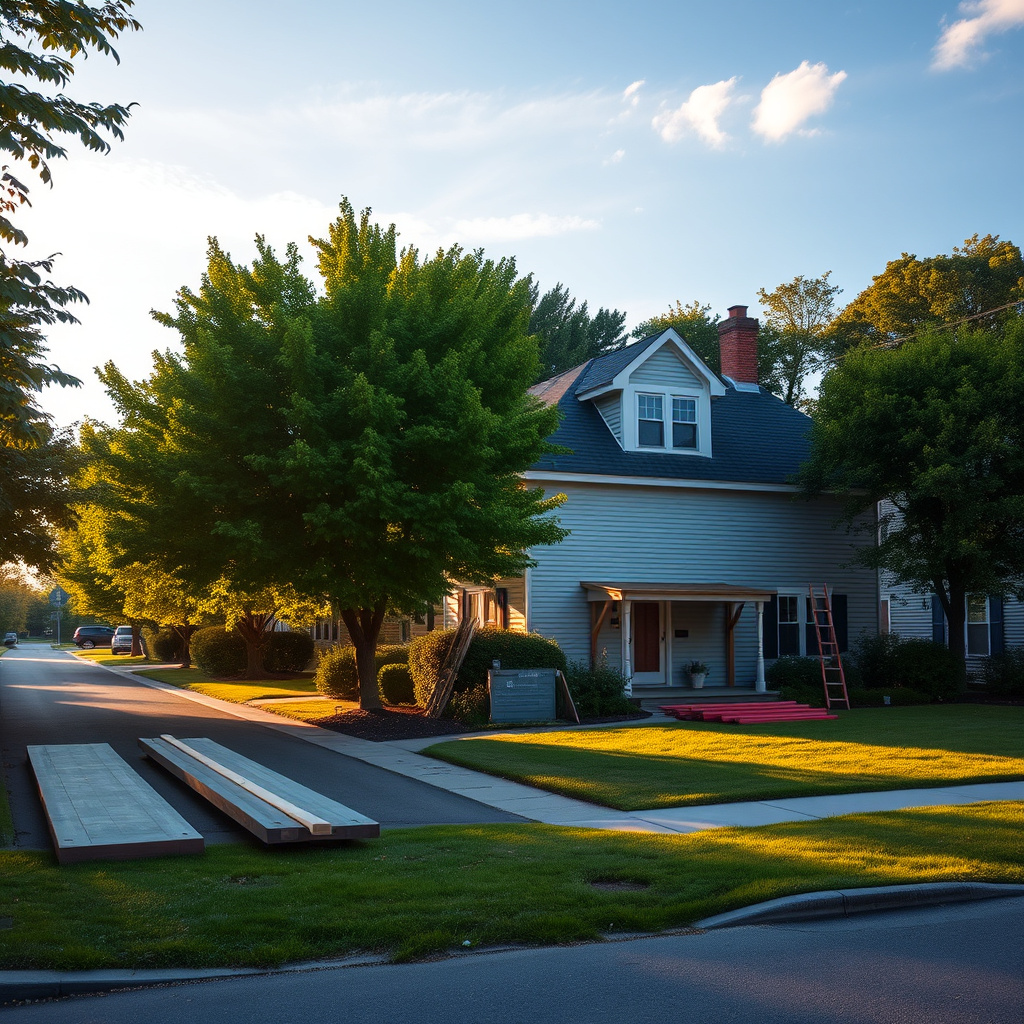Easy home addition permit process Massachusetts refers to the streamlined steps and requirements needed to obtain permits for home additions in the state.
Are you a Brazilian entrepreneur navigating the complexities of home additions in Massachusetts?
The easy home addition permit process Massachusetts is crucial for making your expansion dreams a reality.
In this post, you’ll discover practical steps, common pitfalls to avoid, and valuable insights that will empower you to tackle the permitting process with confidence. By the end, you’ll be equipped with the knowledge to streamline your project’s approval, ensuring a smooth transition from vision to construction.
Understanding the Basics of Home Addition Permits
When considering a home addition, navigating the permit process can seem daunting. However, understanding the essentials can simplify the journey significantly. A home addition not only enhances your living space but can also increase the value of your property. Yet, before you start knocking down walls or extending your kitchen, it’s crucial to grasp the basics of obtaining a permit.
Why You Need a Permit
Obtaining a permit is a legal requirement in most areas, including Massachusetts. This process ensures that your addition complies with local building codes and zoning laws. By securing the proper permits, you can avoid fines and complications down the road. Also, it guarantees that the work is done safely, protecting both you and future occupants.
Steps in the Permit Process
Understanding the easy home addition permit process in Massachusetts involves a few key steps:
- Research Local Regulations: Start by checking with your local building department to understand specific requirements for your area. Regulations can vary significantly, so it’s essential to get the correct information tailored to your municipality.
- Prepare Your Plans: Work with a qualified architect or designer to create detailed blueprints of your proposed addition. These plans should comply with local building codes and zoning requirements.
- Submit Your Application: Once your plans are ready, submit your application along with any required documentation. This may include site plans, structural details, and even environmental assessments if necessary.
- Pay the Fees: Be prepared to pay fees associated with your permit application. These costs can vary, so it’s advisable to confirm them beforehand.
- Wait for Approval: After submission, there will be a waiting period for your application to be reviewed. This could take anywhere from a few weeks to several months, depending on the complexity of your project and the workload of your local building department.
- Begin Construction: Once you receive approval, you can start your project. Ensure to keep your permit on-site, as inspectors may need to verify compliance during the construction process.
Working with Professionals
Engaging with professionals such as roofing contractors in Worcester MA or specialists in kitchen remodeling in Boston MA can help streamline your home addition. Their expertise not only aids in navigating the permit process but ensures that your project aligns with best practices and local standards. Additionally, they can offer valuable insights into construction marketing strategies to boost your project’s visibility and success.
Common Challenges
During the permit process, homeowners may face various challenges, such as delays due to incomplete paperwork or changes in local regulations. Being proactive about gathering all necessary documents and staying informed can mitigate these issues. Networking with other homeowners or professionals in the construction field can provide insights and tips on how to navigate these challenges effectively.
Final Thoughts
Understanding the basics of home addition permits is crucial for a successful renovation project. With the right information and support, you can turn your vision into reality while ensuring compliance with local laws and regulations. Whether you’re planning an expansive addition or a simple remodel, taking the time to comprehend the process can lead to a smoother experience and a successful renovation that enhances your home’s value and functionality.
Step-by-Step Guide to the Permit Application
Applying for a permit can feel overwhelming, especially when embarking on a home addition project. However, with a structured approach, you can navigate the easy home addition permit process Massachusetts smoothly. Here’s a detailed guide to help you through each step.
1. Determine the Type of Permit Needed
Before you begin, identify what kind of permit your project requires. In Massachusetts, different types of additions, such as a new bathroom or expanded kitchen, may have specific regulations. Check with your local building department to find out the exact requirements. This initial step is crucial as it sets the tone for the entire application process.
2. Gather Necessary Documentation
Once you know the type of permit you need, start collecting the necessary documents. Typically, you will need:
- Property deed
- Site plan
- Construction drawings
- Detailed project description
- Proof of ownership
Ensure that all documents are accurate and up-to-date. This preparation will save you time and headaches later on.
3. Complete the Application Form
With your documents in hand, fill out the permit application form. This form will ask for specific details about your project, including the scope of work and timelines. Take your time to provide clear and concise information. If you’re unsure about any section, don’t hesitate to ask for help from your local building department or a professional contractor.
4. Submit the Application
After completing the application, submit it along with your documentation. Some municipalities may allow electronic submissions, while others require in-person delivery. Make sure to keep a copy of everything you submit for your records.
5. Pay the Required Fees
Permitting often comes with fees that vary by project size and location. Be prepared to pay these fees upon submission of your application. Confirm the payment methods accepted by your local building department to avoid any delays.
6. Wait for Review and Approval
After submission, your application will undergo a review process. This can take anywhere from a few days to several weeks, depending on the complexity of your project and the workload of the department. During this time, officials may reach out for additional information or clarification.
7. Prepare for Inspections
Once your permit is approved, you’ll need to schedule inspections at various stages of your project. Inspections ensure that the work complies with local codes and safety regulations. Make sure to keep your contractor informed about these requirements to ensure a smooth inspection process.
8. Start Your Project
With your permit in hand and inspections scheduled, you can finally begin your home addition project! This is where your planning pays off. Enjoy the process and stay in communication with your contractor to address any issues that may arise.
9. Final Inspection and Permit Closure
Once your project is completed, a final inspection will be necessary to close out your permit. This step is essential as it confirms that all work has been completed according to local codes. After passing, you’ll receive a certificate of occupancy, allowing you to officially enjoy your new space.
Navigating the building permit Massachusetts process doesn’t have to be daunting. By following these steps, you can streamline your application and move forward with your exciting home renovation project. Whether you’re considering kitchen remodeling Boston MA or expanding your living space, staying organized and informed will help you achieve your goals efficiently.
Common Mistakes to Avoid When Applying for a Permit
Applying for a permit can often feel overwhelming, especially when it comes to home renovation Massachusetts projects. However, avoiding common mistakes can make the process smoother and more efficient. Here are some pitfalls to watch out for during your application.
Inadequate Research
Before you even begin filling out your application, it’s essential to conduct thorough research. Many applicants jump in without understanding the specific requirements for their project. Each municipality may have different regulations and guidelines, so familiarize yourself with the local rules regarding the building permit Massachusetts. This includes zoning laws, required documentation, and any fees associated with your application.
Incomplete Documentation
One of the most frequent mistakes is submitting incomplete or incorrect documentation. Ensure that you gather all necessary paperwork, including site plans, structural drawings, and any other specific documents required for your project. Double-check that everything is filled out correctly. Missing or incorrect information can delay your permit approval, causing unnecessary frustration and potential financial loss.
- Site plans showing property boundaries
- Detailed construction drawings
- Proof of ownership
Ignoring Deadlines
Every permit application has deadlines that must be adhered to. Ignoring these timelines can lead to delays or even denial of your permit. Make a calendar of important dates and ensure that you submit your application well before any deadlines. Staying organized can save you a lot of headaches in the long run.
Neglecting to Consult Professionals
While it’s tempting to tackle the application on your own, consulting professionals can provide valuable insights. Whether it’s hiring roofing contractors Worcester MA or seeking advice from a local architect, expert guidance can help you navigate the complexities of the permit process. They can also assist you in creating a strong application that meets all necessary criteria.
Underestimating Costs
Many homeowners forget to budget adequately for the application process. Costs can quickly add up, from fees associated with the permit itself to expenses related to necessary modifications or professional consultations. Be sure to account for all potential costs to avoid financial surprises down the line.
Failing to Communicate with Local Authorities
Finally, failing to maintain open lines of communication with local authorities can lead to misunderstandings and delays. Don’t hesitate to reach out if you have questions or need clarification on specific requirements. This proactive approach not only helps ensure your application is complete but also fosters a good relationship with the permitting office, which can be beneficial throughout the process.
In summary, being aware of these common mistakes can significantly enhance your chances of a successful permit application. By conducting thorough research, preparing complete documentation, adhering to deadlines, consulting professionals, budgeting appropriately, and communicating effectively with local authorities, you can streamline the process and focus on your exciting home addition project. This is especially important in the context of kitchen remodeling Boston MA, where attention to detail and proper planning can lead to stunning results. Don’t forget that investing in your digital presence for contractors can also help you connect with the right professionals for your needs.
Local Regulations and Their Impact on Your Project
When planning a home addition, awareness of local regulations is crucial. These rules can significantly shape your project’s design, timeline, and overall success. Each locality has its own set of regulations that govern various aspects of construction, including zoning laws, building codes, and permit requirements. Understanding these regulations is not just a bureaucratic hurdle; it’s a vital part of ensuring that your project aligns with community standards and safety requirements.
The Importance of Compliance
Navigating local regulations isn’t merely about following rules; it’s about safeguarding your investment. Non-compliance can lead to fines, mandatory alterations, or even the complete halt of your project. In Massachusetts, for example, understanding the building permit Massachusetts process is essential. Failing to secure the necessary permits can result in costly delays and complications.
Engaging with Local Authorities
Before you break ground, it’s wise to engage with your local building department. They can provide invaluable insights into the specific requirements for your home addition. Local officials are often more than willing to help you understand the nuances of the process, from zoning restrictions to the specifics of construction permits. This proactive approach can save you significant time and resources down the line.
Design Considerations
Local regulations often dictate the design parameters of your project. This includes setbacks, height restrictions, and even materials used. For instance, if you’re considering kitchen remodeling Boston MA, you may need to adhere to specific design guidelines that reflect the historical character of the neighborhood. Paying attention to these details not only ensures compliance but can enhance the aesthetic appeal of your project, making it a valuable addition to your community.
Permitting Process Overview
The permitting process can feel daunting, but breaking it down into manageable steps can make it easier. After determining your project’s design and engaging with local authorities, you’ll need to submit your plans for review. This is where understanding the Easy home addition permit process Massachusetts becomes beneficial. Ensure that all necessary documentation is complete and accurate to avoid delays.
- Prepare detailed plans that comply with local building codes.
- Collect any additional documentation required by your local building department.
- Submit your application and pay the associated fees.
Being thorough in this stage can significantly increase your chances of a smooth approval process.
Staying Informed About Changes
Local regulations can evolve, so it’s important to stay informed about any changes that may impact your project. Engaging with local contractor associations or networking with fellow builders can provide insights into emerging trends and updates in regulations. This proactive approach can help you adapt your construction marketing strategies and ensure your project remains compliant.
In the context of home renovation Massachusetts, keeping abreast of local regulations not only protects your investment but also enhances your reputation as a responsible contractor. By prioritizing compliance and understanding the local landscape, you can position your business for success in the competitive construction market.
Engaging with Local Authorities: What You Need to Know
When you’re embarking on a home addition project, connecting with local authorities is a crucial step that can significantly influence the success of your endeavor. Understanding how to navigate this engagement can make the easy home addition permit process in Massachusetts much smoother and more efficient.
Understanding the Importance of Communication
First and foremost, it’s essential to recognize that local authorities are there to help you. They have a wealth of knowledge and resources at their disposal and can guide you through the necessary procedures. Building a rapport with them can aid in clarifying regulations and expectations. When you approach them, do so with a mindset of collaboration rather than confrontation. This attitude fosters a more productive relationship, which can be beneficial throughout your project.
Gathering Relevant Information
Before you engage with local authorities, it’s advantageous to gather as much information as possible about your specific project. This includes understanding the building permit Massachusetts requirements that apply to your home addition. Familiarize yourself with local zoning laws, building codes, and any other regulations that might affect your project. By arriving prepared with this knowledge, you demonstrate respect for the authorities’ time and expertise, making them more inclined to assist you.
Preparing Your Questions
As you prepare to engage with local authorities, compile a comprehensive list of questions. This could include inquiries about timelines for permit approvals, specific documentation required, and potential fees involved. It’s also helpful to ask about any common pitfalls that other homeowners have faced in similar projects. Being proactive in this way not only shows your commitment but also helps you avoid common mistakes that can delay your project.
Utilizing Digital Tools
In the current digital landscape, many local authorities provide online resources that can simplify your interactions. Websites often have downloadable forms, FAQs, and contact information for relevant departments. Make sure to leverage these resources to expedite the home renovation Massachusetts process. Additionally, consider utilizing social media channels where local authorities may post updates or respond to community inquiries.
Networking and Building Relationships
Beyond just the transactional aspect of obtaining permits, building a network within your local community can be incredibly beneficial. Attend town hall meetings, community forums, or local construction-related events to meet officials and other stakeholders. This not only broadens your understanding of local regulations but also opens doors for collaboration with other professionals, such as roofing contractors in Worcester MA or specialists in kitchen remodeling in Boston MA. Engaging with these experts can enhance your project’s overall quality and adherence to local standards.
Follow-Up and Stay Informed
After your initial conversations with local authorities, it’s critical to follow up. This not only shows your dedication but also helps ensure that your project remains on track. Stay informed about any changes in regulations or procedures that could impact your home addition. Regular communication can help you adapt to any new requirements and avoid unnecessary delays.
Incorporating these strategies into your approach to engaging with local authorities can help you navigate the complexities of the permit process more effectively. By fostering positive relationships, staying informed, and being proactive, you set the stage for a successful home addition that meets both your vision and local regulations.
Timelines: How Long Does the Permit Process Take?
Navigating the permit process for your home addition can feel overwhelming, especially when you’re eager to start your project. Understanding the timeline involved can help ease some of that stress. While each project is unique, a few key factors influence how long the easy home addition permit process in Massachusetts might take.
Initial Assessment and Documentation
The first step usually involves gathering all necessary documentation and submitting your application. This can take anywhere from a few days to a couple of weeks. Ensuring that you have all required plans and information ready can significantly speed up the process. If you’re working with professionals like architects or contractors, they can provide valuable assistance in preparing the necessary paperwork, which is crucial for a smooth submission.
Review and Approval Process
Once your application is submitted, the local authorities will begin their review. This phase typically lasts between two to six weeks, depending on the complexity of your project and the current workload of the permitting office. During this time, they will assess your plans for compliance with local codes and regulations. It’s important to stay in touch with the permitting office; proactive communication can help you address any issues that may arise faster.
Common Delays
Several factors can lead to delays in the permit process. For instance, if your project requires additional documentation or revisions, it can extend the timeline. Additionally, if your plans are not in line with local building codes, you may need to make adjustments that could take extra time. Understanding these potential hold-ups in advance can prepare you for any bumps in the road.
Final Steps
After the review, if all goes well and your application is approved, you’ll receive your permit. This final step can take another week or two, as the office may require time to finalize the paperwork. Once you have your permit in hand, you can confidently move forward with your home addition.
Engaging with Local Authorities
Building a good relationship with local authorities can also play a significant role in how quickly your permit is processed. Being responsive to requests for additional information and maintaining clear communication can help prevent unnecessary delays. Additionally, having a solid understanding of local regulations can ensure that your project aligns with community standards, further smoothing the way for approval.
In today’s competitive market, it’s beneficial to employ effective construction marketing strategies that can help you navigate the complexities of the permitting process. For example, utilizing digital presence for contractors can provide you with insights into local permitting trends and best practices. Engaging in networking for Brazilian entrepreneurs in construction can also lead to valuable connections that may support your project.
By being informed and proactive, you can streamline your home addition journey, turning what could be a tedious process into an exciting opportunity to enhance your living space.
Post-Permit: Next Steps for Your Home Addition Project
After successfully navigating the permit process, it’s time to dive into the exciting next steps of your home addition project. With your approved building permit Massachusetts in hand, you can now move forward with your plans. This phase involves several critical actions that will help ensure your project runs smoothly and remains within the guidelines set forth by local authorities.
Choosing the Right Contractor
Selecting a qualified contractor is one of the most pivotal decisions you’ll make. Look for professionals who specialize in home renovation Massachusetts and have a strong track record in managing similar projects. Ask for references, check reviews online, and ensure that they are licensed and insured. This diligence will save you from potential headaches down the line.
- Interview multiple candidates: Don’t settle for the first contractor you meet. Schedule interviews to discuss your vision and gauge their enthusiasm for your project.
- Review portfolios: A contractor’s past work can give you insight into their style and capability. Pay attention to projects that resemble your planned addition.
- Discuss timelines: Establish clear milestones and deadlines to keep your project on track.
Budgeting for Unexpected Costs
Even with careful planning, unexpected expenses can arise during construction. It’s wise to set aside an additional 10-20% of your overall budget to accommodate unforeseen circumstances. This cushion can cover anything from design changes to unforeseen structural issues that may get uncovered during the renovation.
Communicating with Your Neighbors
Before construction begins, it’s courteous to inform your neighbors about the upcoming work. Open lines of communication can help mitigate potential concerns they might have regarding noise or disruptions. A friendly conversation can go a long way in maintaining good relationships within your community.
Preparing Your Home and Property
As your project kicks off, consider how to prepare your home and property for the construction phase. This could involve:
- Clearing the work area: Remove any plants, furniture, or decorations from the construction zone to ensure a safe working environment.
- Securing your pets: Make arrangements for your pets to be kept away from the construction site to avoid stress and ensure their safety.
- Planning for access: Ensure that your contractor has unobstructed access to your home and the work area.
Monitoring Progress and Staying Informed
Once construction begins, staying engaged with your contractor is key. Regular check-ins can help you stay informed about progress and any challenges that arise. This proactive approach allows for timely adjustments and ensures that the project aligns with your expectations.
Marketing Your Project
If you’re considering how this project fits within a broader context, especially if you’re a contractor, think about the potential for lead generation for construction businesses. Documenting your home addition journey can provide valuable content for your website, enhance your digital presence for contractors, and showcase your work on social media platforms. This not only helps in marketing your project but also attracts potential clients looking for kitchen remodeling Boston MA or bathroom remodeling.
By staying organized and proactive, you can transform your vision into reality while maintaining a strong connection with your community and potential clients.
Resources for Brazilian Entrepreneurs in Massachusetts
If you’re a Brazilian entrepreneur navigating the vibrant business landscape of Massachusetts, you’re not alone. The state is home to a diverse community of entrepreneurs who share your passion and drive. Whether you’re involved in construction, retail, or technology, there are numerous resources available to support your journey.
Networking Opportunities
One of the most valuable assets for any entrepreneur is a strong network. In Massachusetts, there are various organizations specifically tailored for Brazilian entrepreneurs. These networks often host events and workshops that allow you to connect with fellow business owners, share experiences, and learn from one another. Engaging with local authorities and industry leaders can open doors to new opportunities and partnerships.
- Join local Brazilian chambers of commerce to meet like-minded individuals.
- Participate in workshops focused on entrepreneurship and business development.
- Attend networking events to build relationships with potential clients and partners.
Access to Funding
Financial support is crucial for any business endeavor. In Massachusetts, there are several programs and organizations that provide funding opportunities specifically for minority and immigrant entrepreneurs. These resources can include grants, low-interest loans, and investment opportunities. Research local banks and credit unions that offer programs for small businesses, particularly those aimed at supporting the Brazilian community.
Business Development Programs
Many organizations in Massachusetts offer business development programs that provide training, mentorship, and resources tailored to your needs. These programs often focus on essential skills such as marketing, finance, and operations. By participating in these initiatives, you can enhance your business acumen and gain insights into effective construction marketing strategies or lead generation for construction businesses.
Digital Presence
In today’s digital age, having a strong online presence is essential. For Brazilian entrepreneurs in the construction sector, focusing on website design for contractors and SEO for construction businesses can significantly impact your visibility and customer engagement. Utilize social media platforms to showcase your projects, share testimonials, and connect with potential clients. Effective online advertising for builders can also help you reach a broader audience.
Local Regulations and Compliance
Understanding local regulations is vital for the success of your business. Whether you’re involved in kitchen remodeling Boston MA, roofing contractors Worcester MA, or any other construction-related field, staying compliant with state laws is crucial for smooth operations. Familiarize yourself with the building permit Massachusetts requirements to avoid potential setbacks. Consulting with local experts can provide clarity on navigating the regulatory landscape.
Community Support and Resources
The Brazilian community in Massachusetts is robust and supportive. Many organizations provide resources tailored to the unique challenges faced by immigrant entrepreneurs. Look for community centers that offer workshops, legal advice, and business consulting services. Engaging with these resources can provide you with the confidence and knowledge needed to thrive in your industry.
In conclusion, as a Brazilian entrepreneur in Massachusetts, you have access to a wealth of resources designed to help you succeed. By leveraging networking opportunities, funding programs, and community support, you can navigate the complexities of starting and growing your business in this dynamic environment.

At Builders RD, our editorial team is made up of construction professionals, researchers, and local content strategists who specialize in home improvement, permitting, and contractor services across Massachusetts. We work closely with industry experts, licensed contractors, and municipal guidelines to deliver accurate, actionable content that helps homeowners, investors, and builders make confident decisions.
Our mission is to simplify the construction process through trustworthy guidance — from permit applications to hiring the right team — so you can build smarter, safer, and with full peace of mind.
— Builders RD Editorial Team






